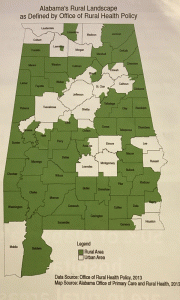Alabama Hospital Association talks on future of healthcare
Published 11:41 am Thursday, December 22, 2016
With recent controversy surrounding the state of healthcare in America and specifically Alabama, local representatives from the Crenshaw Community Hospital decided to seek the advice of the Alabama Hospital Association.
On Monday, Luverne Rotary Club member and Crenshaw Community Hospital CEO Lee Anne Montgomery invited Margaret Whatley, Governmental Relations specialist for the Alabama Hospital Association, to speak to Rotarians about the Affordable Care Act, the current state of healthcare in Alabama, the role rural hospitals play in communities like Crenshaw and what we can expect in the coming years under President-elect Donald Trump.
 “There is a whole mess of stuff going on with healthcare right now, is the best way to put it, and there’s a lot of uncertainty,” Whatley said.
“There is a whole mess of stuff going on with healthcare right now, is the best way to put it, and there’s a lot of uncertainty,” Whatley said.
“Crenshaw Community Hospital is a huge employer in this community, and it’s an important role in economic development.”
According to Whatley, 53 out of 67 Alabama counties are rural, which means that 40 percent of Alabamians live in rural areas, and 50 percent of Alabama’s hospitals are in rural areas.
Hospitals also serve as a top five employer in 60 percent of rural counties, and 14 percent of total employment in rural areas is attributed to health care.
From the years 2011 to 2014, five rural hospitals closed in Alabama.
Whatley also took time to tell the audience about the Affordable Care Act and what may happen to the program throughout the next four years.
“Moving forward whatever we anticipate, we’re guessing, because this is kind of a whole new world and no one knows where we’re going, what’s going to happen or what it’s going to look like with healthcare and beyond,” Whatley said.
“What we’re hearing right now is a lot of repeal and replace, but it will most likely be more like defund and delay. What they’re going to do in Congress is use a process called reconciliation, which is just a fancy way to pass a bill essentially. They are going to pass a bill that defunds the Affordable Care Act. ”
Currently, Whatley says that it is unclear whether the Affordable Care Act will be completely defunded, but there has been indication that the money has been set aside for Medicaid expansion, which Alabama has not done yet but 31 other states have.
“They are going to pull that money back; they are going to defund that part of the law to put new money into whatever they are going to create,” Whatley said.
“They are going to defund the insurance exchanges and the subsidies that go with that, but understanding that none of this stuff can just be a flip of the switch because it will disrupt the entire healthcare marketplace.”
Whatley says that the bill will likely be passed in January or February, but the effective date will be either October 1, 2018, or October 1, 2019.
“These are just what the rumors are as of today; they could change tomorrow, but as much repeal and replace talk that has gone on, I don’t know that our professional leadership ever thought they would have the opportunity to actually replace,” Whatley said.
“So, they passed a lot of bills that repeal it but President Obama vetoed. But now that they are at the point of replace, they are all sitting down now with pen and paper trying to figure out what replace will actually look like. This way they an live up to the campaign promise of repealing by defunding it, effective either 2018 or 2019, and then have some time to sit down and figure out what it’s actually going to look like to replace it.”
Whatley also stated that hospitals nationwide became uneasy when the Affordable Health Care was first passed because the program assumed everyone would have health insurance.
“Hospitals previously have gotten federal funding for taking care of the uninsured, because as you know when you come to the emergency room door, they will treat you regardless of your ability to pay,” Whatley said.
“That very little money was being taken away from hospitals under the assumption that everyone would have health insurance. So, moving forward in this defunding of Obamacare, we’re advocating as the Hospital Association that that money be returned to the hospitals and not put into the pot to fund some other program.”
Whatley also explained the importance of Medicaid to not only those enrolled in it, but also to the community in general.
“There’s no easy answer in terms of how to fund essential state services in government, but Medicaid is not always the culprit. It’s not that it’s growing out of control, it’s just that the funding mechanisms for it are kind of messed up,” she said.
“A lot of people don’t think Medicaid doesn’t matter to them, but it’s essential to ensuring access to healthcare, it’s essential to ensuring that your hospital can stay open 24 hours a day seven days a week and that it can provide all the services that you need. If Medicaid cuts continue to come in like some are proposing, all that’s left to do is for hospitals like Community to look and see what they can do.”
Whatley concluded that there is still much uncertainty in the field of healthcare, but she urges Alabamians not to fret. As of now, it’s a wait and see situation, and Whatley holds out hope for the best.
She also encourages community leaders to lend their voice in protecting access to healthcare.
“Going forward with the defunding of the Affordable Care Act, it’s anybody’s guess right now. We as an association have been advocating for take it slow, let’s look at what everything is and the long term implications,” Whatley said.





